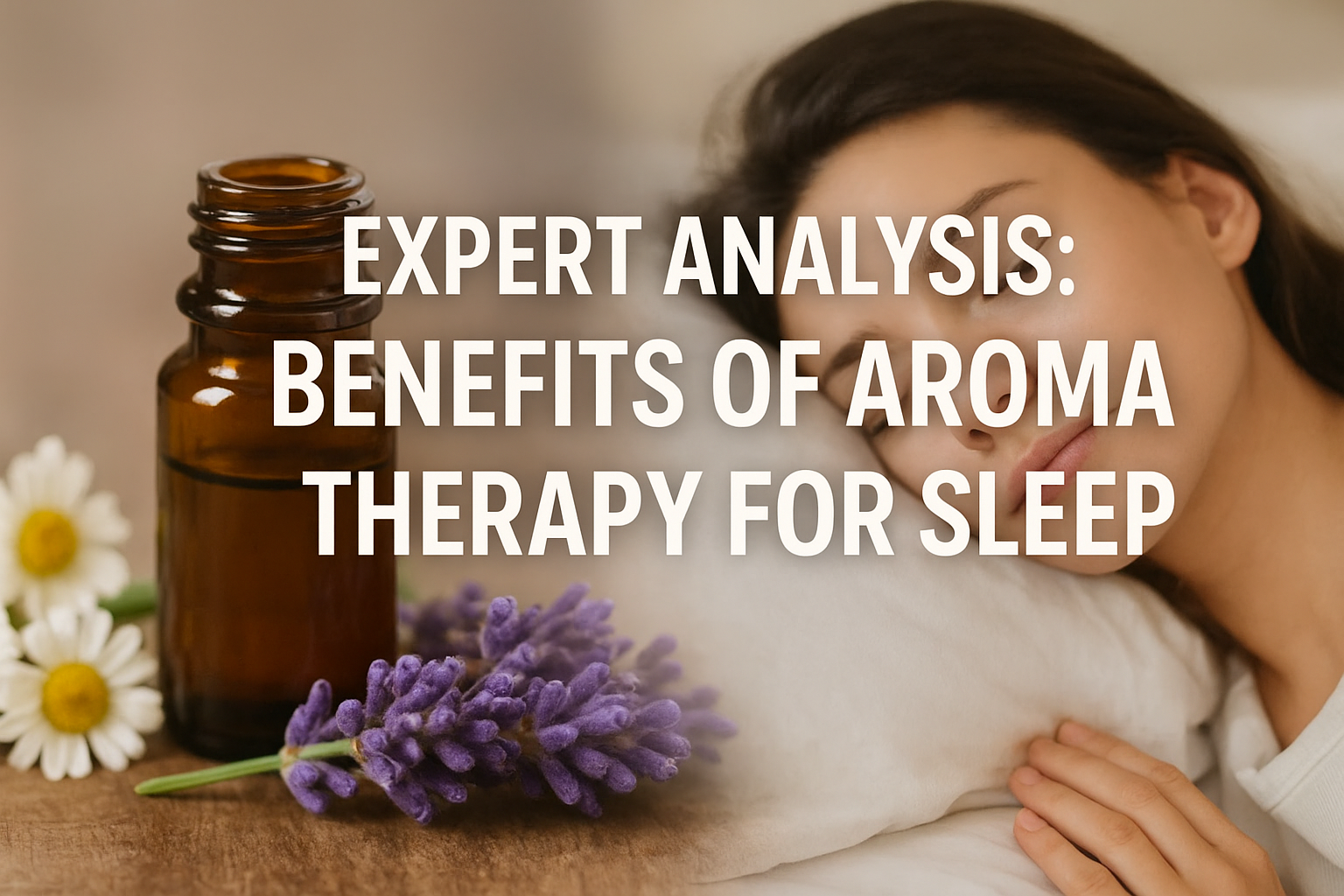Introduction: The Science Behind Scent and Sleep
Sleep is the foundation of mental and physical well-being, yet millions struggle with insomnia and restlessness. Amid modern sleep aids and digital detox routines, aroma therapy has emerged as a natural, effective, and science-backed method for improving sleep quality.
According to a 2024 Journal of Sleep Research study, individuals who used lavender and chamomile essential oils before bed reported 37% better sleep quality and lower stress hormone levels compared to those who didn’t.
In this expert analysis, we’ll explore the scientific, psychological, and holistic benefits of aroma therapy for sleep, highlighting the best essential oils, methods of use, and expert-backed insights for achieving truly restful nights.
What Is Aroma Therapy and How It Works
Aroma therapy, also known as essential oil therapy, is a holistic healing practice that uses plant-based essential oils to promote physical and emotional well-being. These natural extracts interact with the olfactory system, which directly influences the brain’s limbic region—the area responsible for emotions, memory, and sleep regulation.
When inhaled or applied topically, essential oils trigger a neurochemical response that helps calm the nervous system, slow the heart rate, and prepare the body for rest.
The Role of Aroma Therapy in Better Sleep
Aroma therapy supports sleep through multiple mechanisms, making it a preferred natural solution for those seeking an alternative to medication.
1. Calms the Nervous System
Essential oils like lavender, bergamot, and ylang-ylang contain linalool and linalyl acetate, compounds known for their sedative and anti-anxiety effects. They help reduce cortisol levels, the stress hormone that interferes with deep sleep.
2. Balances Hormonal Activity
Aroma therapy influences melatonin production—the hormone that regulates the sleep-wake cycle. Oils such as sandalwood and cedarwood help stimulate melatonin release, aligning the body’s circadian rhythm for better sleep consistency.
3. Enhances Sleep Environment
Scents play a major role in emotional comfort. A few drops of essential oil in a diffuser can transform a stressful bedroom into a serene sleep sanctuary, creating an atmosphere of peace and comfort.
Expert Insights: Top Essential Oils for Sleep in 2025
Aroma therapy experts highlight several essential oils proven effective for relaxation and deep sleep. Here’s a detailed analysis of their properties and effects:
1. Lavender Oil – The Classic Sleep Enhancer
- Rich in linalool and linalyl acetate
- Proven to reduce anxiety and heart rate
- Ideal for inhalation or pillow sprays
2. Chamomile Oil – The Gentle Sedative
- Contains apigenin, which binds to GABA receptors in the brain
- Promotes calmness and muscle relaxation
- Best used in warm baths or diffusers
3. Sandalwood Oil – The Mind-Body Balancer
- Deep woody scent promotes mental clarity and tranquility
- Regulates breathing and reduces nighttime awakenings
- Works well in aroma diffusers before bedtime
4. Bergamot Oil – The Stress Reliever
- Citrus-based yet calming; lowers blood pressure and stress
- Effective in combination blends with lavender or frankincense
5. Frankincense Oil – The Emotional Grounder
- Promotes meditative relaxation and reduces overthinking
- Supports emotional balance before sleep
6. Cedarwood Oil – The Deep Sleep Promoter
- Stimulates serotonin and melatonin pathways
- Especially beneficial for individuals with insomnia or irregular sleep
Aroma Therapy Methods for Better Sleep
Aroma therapy can be integrated into nightly routines through simple and safe methods:
- Diffusion: Add 4–6 drops of essential oil to a diffuser 30 minutes before bedtime.
- Topical Application: Mix essential oils with a carrier oil (like coconut or jojoba) and apply to wrists, temples, or neck.
- Aromatic Bath: Add 5–10 drops of essential oil to warm bath water for pre-sleep relaxation.
- Pillow Spray: Combine essential oils with distilled water in a spray bottle for a soothing linen mist.
Expert Opinion: The Future of Aroma Therapy for Sleep
According to Dr. Meera Saini, Naturopath and Aromatherapist (2025):
“Aroma therapy is not just about pleasant smells—it’s a neurochemical wellness intervention. Essential oils directly influence sleep neurotransmitters like serotonin and GABA, creating measurable improvements in rest quality and mental balance.”
Recent innovations such as AI-personalized scent diffusers and smart sleep aromatherapy pods are redefining how individuals use scent for wellness, blending ancient plant science with modern technology.
Key Benefits of Aroma Therapy for Sleep
- Natural and non-invasive sleep aid
- Reduces anxiety and heart rate before bed
- Improves melatonin production
- Enhances emotional balance
- Promotes longer, deeper sleep cycles
- Safe for long-term use without side effects
Conclusion: Sleep Smarter, Naturally
In a world where sleeplessness has become an epidemic, aroma therapy offers a gentle yet powerful solution. Backed by science and tradition, it works at the intersection of mind, body, and scent, guiding the nervous system toward tranquility.
Whether it’s lavender for calm, sandalwood for balance, or frankincense for mental clarity, integrating aroma therapy into your bedtime ritual could be the key to restful, rejuvenating sleep in 2025 and beyond.
FAQs
1. Can aroma therapy really help with insomnia?
Yes. Clinical studies show that aroma therapy with lavender or chamomile can improve sleep onset and duration in individuals with mild to moderate insomnia.
2. What’s the best way to use essential oils for sleep?
Diffusing or adding oils to a warm bath before bed are the most effective methods.
3. Are there any side effects of aroma therapy?
When used correctly, essential oils are safe. However, always dilute oils before applying to skin and avoid direct ingestion.
4. Can aroma therapy be combined with other sleep aids?
Yes. It complements meditation, herbal teas, and mindfulness routines for a holistic sleep approach.
5. Which oil works best for deep sleep?
Lavender, sandalwood, and cedarwood are among the most effective for inducing deep, uninterrupted sleep.

